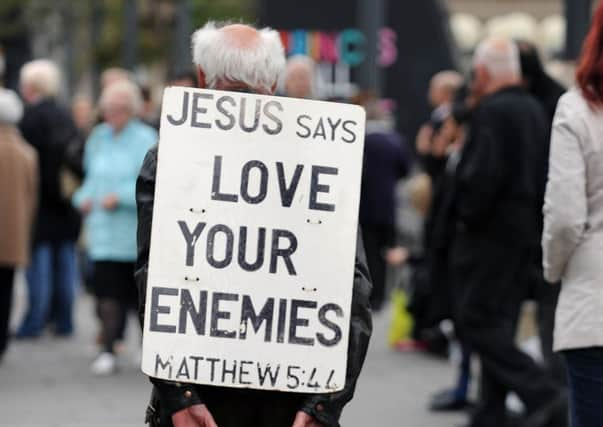The move towards greater religious freedom


I was once walking up Fifth Avenue in New York and, just across from St Patrick’s Cathedral, I stopped to listen to a street preacher. At one point he scanned his audience and, pointing at me, asked: “And what have you done for God today?” A bit startled by this, I blurted out “I was at Mass.”
Let’s just say he wasn’t a fan of ecumenism. I got more denunciations than you will find in the 39 Articles, and so I beat a hasty retreat.
Advertisement
Hide AdAdvertisement
Hide AdA while ago I noticed a preacher attempting to attract a crowd in Buchanan Street in Glasgow and, after my American experience, I gave him a wide berth. Passing along the same street more recently, I was amazed to see how big a crowd the same man had managed to draw.
As I got closer, I realised he was in a dispute with one of his listeners. The man he was arguing with was a Muslim and was comparing the religious claims of the preacher with his own religious outlook.
The crowd were quite enjoying it until the Christian said: “You don’t have a right to an opinion because you don’t have the truth.”
At this, the crowd howled and started to drift away, as did I, leaving the two antagonists almost to themselves. I’d stopped to see how he’d managed to get the size of audience only a really good street performer manages to get.
It was the conflict that was seemingly drawing the crowd, but his attitude finally lost him his congregation. The howl that went up revealed the attitude of the crowd that everyone is entitled to their opinion.
It wasn’t so much sympathy for the position of the Muslim that the crowd were voicing – he was just as adamant – but a basic common view that each is entitled to express his or her own opinion.
A very western concept
Religious freedom is a relatively modern concept. It has only been in the modern world that nations have ceased to favour one religion over another.
At the same time, it does remain a very western concept. “Error has no rights” was the battle cry of those in the Catholic Church at the 1960s Second Vatican Council who didn’t want the Church to admit that the idea of religious freedom was anything more than error itself.
Advertisement
Hide AdAdvertisement
Hide AdThe counter-argument was: it is true error has no rights, but people do.
Rights belong to people, not to ideas or to anything else. This is the world of pluralism, of dialogue, of mutual respect – despite whatever may distinguish us from each other. I bet you that preacher in Buchanan Street isn’t much of an ecumenist nor involved in inter-faith work. For him, error has no rights.
It was interesting earlier this year when Lord Steel weighed in on the question of whether abortions should be allowed on the basis of gender.
This was after the Director of Public Prosecutions in England declined to prosecute doctors who were acceding to such requests. Lord Steel is opposed to this kind of abortion, calling it “repugnant”.
Another member of the House of Lords, Baroness Knight, who was an MP at the passing of the 1967 Abortion Act, said that no-one would have “dreamt it was necessary to put an amendment down to protect girl babies”.
Unintended consequences
Of course, some of us have been going on about such unintended consequences for decades in many things.
In the moves towards greater secularisation, our fear is that religious freedom itself will be compromised by ill-thought-out legislation which is then interpreted in a way that parliament never intended.
The other debate about unintended consequences is around press freedom. I have great sympathy with those who have been hurt by unjust intrusion and comment in the media.
Advertisement
Hide AdAdvertisement
Hide AdTrying to break an established narrative is an almost impossible task when dealing with some journalists. It’s almost as if facts are looked for to confirm a prejudged (prejudicial) narrative rather than trying to establish what happened by looking at the facts.
It was Alastair Campbell who laid out that accusation. These matters need to be addressed, but perhaps religious freedom isn’t the only thing that is in danger. What unintended consequences lie ahead for freedom of speech if, say, in a generation, any laws passed now to regulate the media are interpreted in a way that our present leaders would never intend? Who will be creating the narrative then?
• Father Thomas Boyle is assistant general secretary at the Catholic Bishops’ Conference of Scotland
SEE ALSO